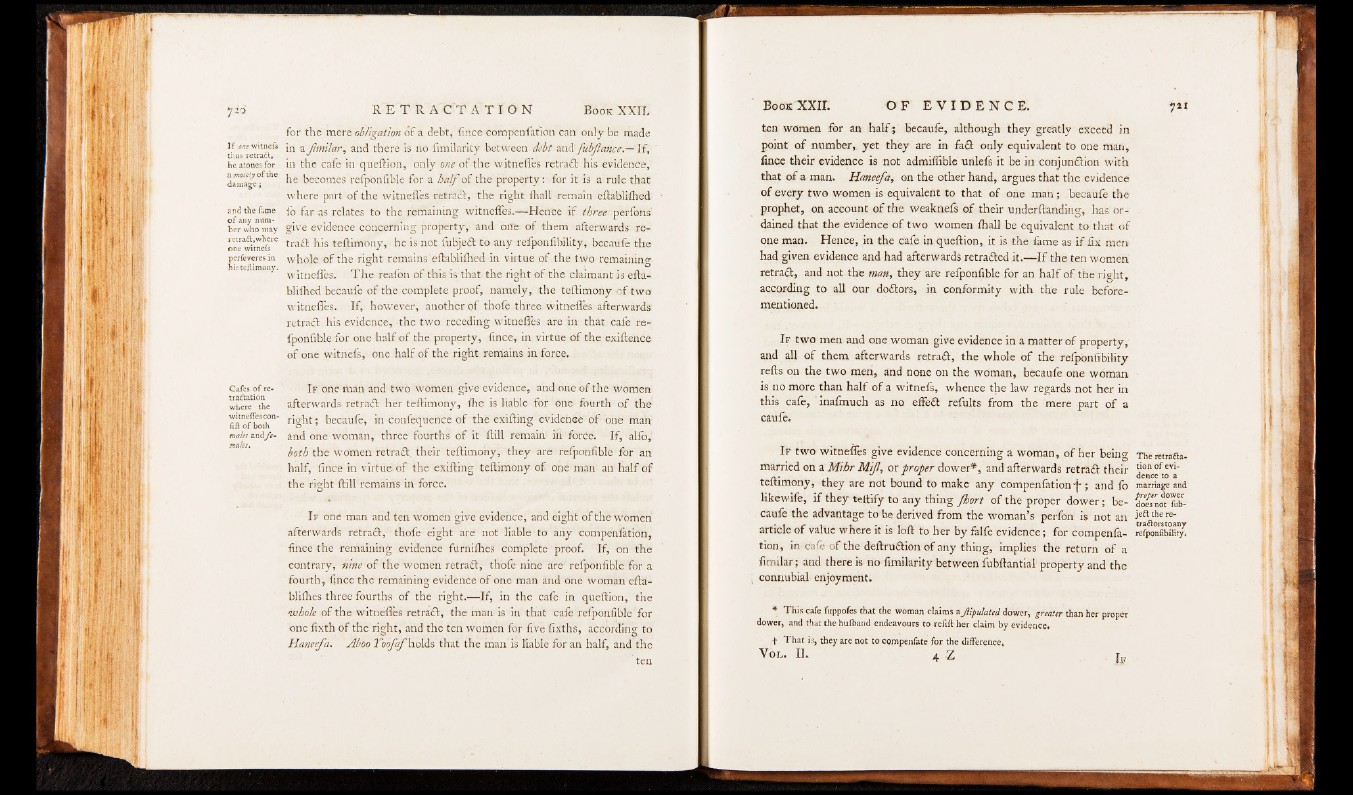
I f one witnefs
thus retraft,
he atones for
a moiety of the
damage;
and the fame
o f any number
who may
retradt,where
one witnefs
perfeveres in
his teflimony.
Cafes o f retractation
where the
witneflescon-
fift o f both
males andf e males.
for the mere obligation of a debt, fince compenfation can only be made
in aJimilar, and there is no fimilarity between debt andfubJlance.— H,
in the cafe in queftion, only one of the witnefles retradt his evidence,
he becomes refponfible for a half of the property:- for it is a rule that
where part of the witnefles retradt, the right fhall remain eftablifhed
lo far as relates to the remaining witnefles.— Hence if three perfons'
give evidence concerning property, and oiTe of them afterwards retradt
his teflimony, he is not fubjedt to any refponfibility, becaufe the
whole of the right remains eftablilhed in virtue of the two remaining
witnefles. T h e reafon of this is that the right of the claimant is efta-
blifhed becaufe of the complete proof, namely, the teflimony of two
witnefles. If, however, another of thofe three, witnefles afterwards
retradt his evidence, the two receding witnefles are in that cafe refponfible
for one half of the property, fince, in virtue of the exiftence
of one witnefs, one half of the right remains in force.
If one man and two women give evidence, and one of the women
afterwards retradt her teflimony, Ihe is liable for one fourth of the
right; becaufe, in confequence of the exifting evidence of- one man
and one woman, three fourths of it ftill remain in forte. If, alio,
both the women- retradt, their teflimony, they are refponfible for an
half, fince in virtue-of the exifting teflimony of. one man an half Of
the right ftill remains ill force.
I f one man and ten women give evidence, and eight of the women
afterwards retradt,1-thofe eight are not liable to any compenlation,
fince the remaining evidence furnilhes complete proof. If, on the
contrary, nine of the women retradt, thofe nine are- refponfible for a
fourth, fince the remaining evidence of one man and one woman efta-
blifhes three fourths of the right.— If, in the cafe in queftion, the
whole of the witnefles retradt, the man is in that cafe refponfible for
one fixth of the right, and the ten women for five fixths, according to
Haneefa. Abbo Yoofaf holds that the man is liable for an half, and the
ten
ten women for an half; becaufe, although they greatly exceed in
point of number, yet they are in fadt only equivalent to one man,
fince their evidence is not admiflible unlefs it be in conjunction with
that of a man. Haneefa, on the other hand, argues that the evidence
o f every two women is equivalent to that of one man; becaufe the
prophet, on account o f the weaknefs of their underftanding, has ordained
that the evidence of two women fhall be equivalent to that of
one man. Hence, in the cafe in queftion, it is the fame as if fix men
had given evidence and had afterwards retradted it.— I f the ten women
retract, and not the man, they are refponfible for an half o f the right,
according to all our dodtors, in conformity with the rule before-
mentioned.
I f two men and one woman give evidence in a matter of property,
and all of them afterwards retradt, the whole of the refponfibility
refts on the two men, and none on the woman, becaufe one woman
is no more than half of a witnefs, whence the law regards not her in
this cafe, inafmuch as no effedt refults from the mere part of a
caufe.
The retractation
o f evidence
to a
marriage and
proper dower
does not fub-
jedl the retractors
to any
refponfibility.
I f two witnefles give evidence concerning a woman, of her beino-
married on a M i hr Miß, or proper dower*, and afterwards retradt their
teflimony, they are not bound to make any compenfation- j - ; and fo
likewife, if they tettify to any thing fhort of the proper dower; becaufe
the advantage to be derived from the woman’s perfon is not an
article of value where it is loft to her by falfe evidence; for compenfation,
in c a fe of the deftrudtion of any thing, implies the return of a
fimilar; and there is no fimilarity between fubftantial property and the
\ connubial enjoyment.
* T h is cafe fuppofes that the woman claims a Jiipulated dower, greater than her proper
dower, and that the huiband endeavours to refift her claim by evidence.
t T h a t is, they are not to compenfate for the difference,
V O L . II. 4 Z . | |